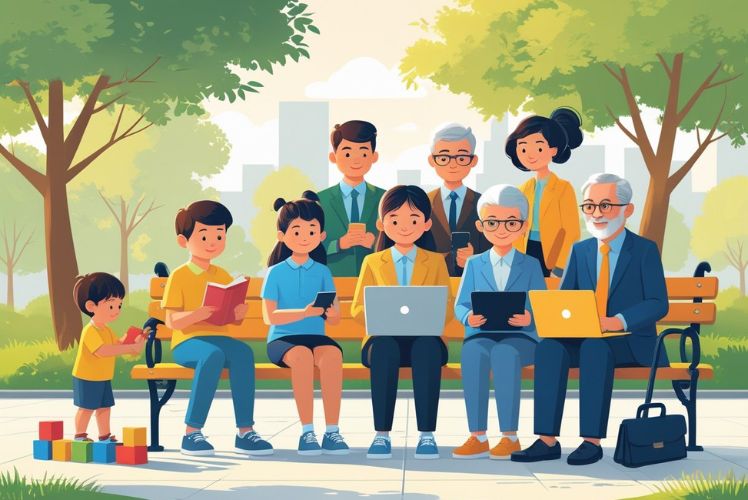As we navigate through a rapidly evolving world, it becomes essential to understand the different age generations that shape our society today. Each generation has unique attributes that influence their values, communication styles, and behaviours. From the Baby Boomers, who experienced life before the internet, to Generation Z, who are digital natives, these groups reflect a wide range of experiences and perspectives.

Generations are not just about dates and names; they embody the cultural and technological shifts of their times. We find that understanding these distinctions helps us appreciate the diverse viewpoints that enrich our communities and workplaces. By exploring the characteristics of various generations, we can foster better communication and collaboration across age groups.
This exploration will shed light on how historical events, technological advancements, and shifting societal norms have crafted the identities we recognise today. Together, we will look at the core values that drive each generation and how these influence our interactions in both personal and professional spaces.
Key Takeaways
- Each generation has unique values that shape their worldview.
- Communication styles vary widely among different age groups.
- Technology has a significant impact on how generations connect and engage.
Understanding Generational Differences
Generational differences arise from the unique experiences and influences that shape each age group. These factors include historical context, technological advancements, and economic changes, which collectively help us understand the distinct characteristics of each generation.
What Defines a Generation
A generation is typically defined by a group of individuals born within a specific time frame, often around 15 to 20 years. This timeframe allows people to share similar formative experiences.
Some well-known generations include:
- Baby Boomers (1946-1964)
- Generation X (1965-1980)
- Millennials (1981-1996)
- Generation Z (1997-2012)
Each generation holds unique attributes shaped by the events they encounter, such as wars, economic shifts, and social movements. These experiences influence their values, work ethics, and communication styles. Understanding these traits helps us recognise the diverse perspectives within our society.
How Historical Context Shapes Generational Attributes
Historical context plays a crucial role in shaping generational attributes. Events like the Great Depression, World Wars, and technological advancements directly impact the outlook and behaviours of each generation.
For instance, Baby Boomers grew up during post-war prosperity, which fostered a sense of stability and hope. In contrast, Millennials faced economic challenges, such as the 2008 financial crisis, shaping their views on career and life.
These historical events create lasting impressions. Thus, we can better appreciate how our backgrounds shape our opinions, behaviours, and interactions with others across different generational lines.
The Influence of Technology and Globalisation
Technology and globalisation have dramatically transformed our world and the way each generation engages with it. The rise of the digital age has fostered an environment where instant communication and access to information are the norms.
Younger generations, like Generation Z, are often seen as “digital natives.” They are adept at utilising technology for collaboration and self-expression. In contrast, older generations experienced technology as a gradual integration. This difference in familiarity shapes our values and preferences in both personal and professional spheres.
Globalisation further influences generational attributes by exposing us to diverse cultures and perspectives. This interconnectedness encourages adaptability but also raises challenges about cultural identity and job competition, showing how generations must navigate a rapidly changing landscape.
Major Generations and Their Distinctive Attributes
We recognise that each generation has unique traits shaped by historical, cultural, and social experiences. Understanding these attributes helps us appreciate how they influence behaviours and expectations in various contexts, including work and social interactions.
Silent Generation: Traditional Values and Resilience
The Silent Generation, born from 1928 to 1945, is known for its traditional values and strong work ethic. This group grew up during economic hardship and world conflicts, shaping their resilience and sense of duty.
Key characteristics include:
- Commitment to Family: They often prioritise family and community, reflecting their upbringing during tough times.
- Strong Work Ethic: Many worked hard in stable jobs, valuing security and loyalty to employers.
- Adaptability: They have shown great adaptability through significant societal shifts, from the Great Depression to the civil rights movement.
This generation’s values continue to influence younger generations.
Baby Boomers: Optimism and Work Ethic
Born between 1946 and 1964, Baby Boomers grew up during a time of prosperity and change. This generation is defined by optimism and a strong individualistic spirit.
Notable traits include:
- Work-centred Approach: They prioritise hard work and career advancement, often defining themselves through their jobs.
- Social Movements: Many were involved in significant social changes, including civil rights and gender equality movements.
- Consumerism: Baby Boomers were the first to experience widespread consumerism, leading to a focus on material success.
Their beliefs about work and success shape many workplace cultures today.
Generation X: Independence and Pragmatism
Generation X, born from 1965 to 1980, experienced significant societal changes, including rising divorce rates and economic challenges. This background fosters independence and a pragmatic outlook.
Key aspects of Gen X include:
- Self-reliance: Often dubbed the “latchkey generation”, many grew up learning to care for themselves.
- Flexibility: They value work-life balance and are often more adaptable in the face of change.
- Scepticism: Having witnessed corporate downsizing, they often approach institutions with caution.
Generation X is positioned between Baby Boomers and Millennials, bridging traditional and modern values.
Millennials: Digital Natives and Social Consciousness
Millennials, also known as Generation Y, were born between 1981 and 1996. This generation is characterised by their comfort with technology and a strong focus on social issues.
Distinctive features include:
- Tech-savviness: Growing up with the internet, they are proficient with digital tools and social media.
- Value-driven: They prioritise social justice, environmental sustainability, and inclusivity in their personal and professional lives.
- Work Expectations: Millennials seek meaningful work and flexibility, often prioritising passion over salary.
Their unique perspective shapes how they interact with brands and workplaces.
Generation Z: Tech-Savvy and Entrepreneurial Spirit
Born from 1997 to 2012, Generation Z is the first cohort to grow up entirely in the digital age. Their attributes reflect both an understanding of technology and a need for authenticity.
Key characteristics include:
- Entrepreneurial Mindset: Many Gen Zers aim to start their own businesses or work freelance, valuing independence.
- Awareness of Diversity: They are highly attuned to social issues, advocating for equity and change in society.
- Digital Native Skills: With technology at their fingertips, they are skilled in navigating online platforms and tools.
Generation Z's insights are increasingly important as they enter the workforce.
Emerging Generations: Gen Alpha and Gen Beta
Gen Alpha, born from 2013 onwards, is poised to be the most technologically immersed generation. They are likely to be shaped by advancements in AI and evolving educational models.
Key attributes we can expect include:
- Integration of Technology: This generation will grow up with smart devices, likely influencing learning and social interactions significantly.
- Diverse Experiences: With global connectivity, they will have increasingly diverse social and cultural interactions.
Gen Beta will follow closely, further embedded in digital experiences. As educators and parents adapt, we will learn more about their unique characteristics in the coming years.
Core Values and Communication Styles Across Generations
Different generations display unique core values and communication styles that reflect their life experiences. Understanding these differences can enhance our interactions in both personal and professional settings.
Work Ethic and Attitudes Towards Employment
Baby Boomers often value dedication and loyalty in the workplace. They tend to favour structured environments and may view work as a central part of their identity.
Generation X, on the other hand, strives for work-life balance. They appreciate independence and flexibility, preferring results over strict adherence to hours.
Millennials place a strong emphasis on purpose in their work. They seek meaningful roles and often expect employers to support social causes.
Generation Z, the youngest in the workforce, values stability but also craves innovation. They are open to change and often prefer remote work options that allow for a better work-life integration.
Evolving Communication Preferences
Communication styles vary significantly across generations. Baby Boomers are inclined towards face-to-face communication, valuing personal connections. They often prefer phone calls and meetings rather than emails or texts.
Generation X embraces both digital and traditional methods. They are comfortable with emails but appreciate clear and concise messages.
Millennials favour instant messaging and social media platforms for communication. They utilise emojis and gifs, reflecting a more casual tone.
Generation Z, the digital natives, favour visual communication through images and videos. This generation tends to favour short, engaging messages over lengthy emails, making platforms like TikTok and Instagram their go-to choices.
Consumer Behaviour and Brand Values
Baby Boomers often remain loyal to established brands. They value quality and consistency, preferring products that have stood the test of time.
Generation X demonstrates a pragmatic approach to consumerism. They weigh quality against cost and are likely to research products thoroughly before making a purchase.
Millennials tend to seek brands aligned with their values. They prioritise sustainability and social responsibility, often supporting companies that give back to the community.
Generation Z is heavily influenced by social media and peer reviews. They value authenticity and prefer brands that engage with social issues, making their buying decisions based on a brand’s ethical stance.
Approaches to Personal Growth and Activism
Baby Boomers often prioritise traditional paths to success, focusing on career advancement. They may not engage as deeply in activism but value community service.
Generation X fosters independence in personal growth. They tend to invest in self-care and continuous education, often supporting causes that enhance personal freedom.
Millennials have a strong inclination towards activism. They actively engage in social movements, using technology to spread awareness and support causes they believe in.
Generation Z is characterised by a proactive approach to activism. They leverage social media to mobilise and advocate for change, strongly advocating for environmental and social justice issues.
Technology and Social Media’s Impact on Generational Identity
Technology and social media greatly influence how different generations form their identities. By examining how these platforms and tools shape our experiences, we can better understand the distinct characteristics of each age group.
Digital Adoption and the Internet
The internet has reshaped our lives in fundamental ways. Digital natives, like Generations Z and Alpha, have grown up with the internet. For them, being online is second nature. They are comfortable navigating various platforms from an early age.
Older generations, such as Baby Boomers, had to adapt to digital advancements later in life. They view the internet differently, often seeing it as a tool for information rather than a vital part of daily life. This difference affects how we connect, share, and communicate.
Moving forward, we see a blend of both worlds. Many individuals across generations now rely on the internet for work, education, and social interaction.
Rise of Mobile Devices and Social Platforms
Mobile devices have made access to social media instantaneous. Platforms like TikTok have changed the way we consume and share content. They allow users to create and engage with short, dynamic videos that emphasize trends and creativity.
Younger generations are particularly drawn to these platforms, using them for entertainment, education, and social networking. In contrast, older generations tend to favour platforms that encourage longer interactions, like Facebook or LinkedIn.
This shift in preference highlights how mobile technology influences our social behaviours. It reflects our desire for quick connections and instant gratification.
Artificial Intelligence and New Work Environments
The rise of artificial intelligence (AI) is transforming our work environments. Remote work and flexible arrangements are now more common, especially since the pandemic. This change benefits younger workers who value flexibility in their careers.
AI tools help streamline workflows and improve productivity. As we adopt these technologies, generational attitudes toward work evolve. Digital natives are now expected to adapt quickly to AI integration in their tasks.
Older generations may find this transition challenging but can offer valuable experience. The merger of AI with our existing work practices creates a unique landscape for every age group.
Differences in Online Behaviour
Online behaviour varies significantly between generations. Digital natives often favour fast-paced, visually stimulating content. They seek engagement through likes, shares, and comments on platforms like TikTok and Instagram.
In contrast, older generations may prefer informative content that fosters deeper discussions. They often utilise social media for networking or staying connected with family and friends.
Understanding these differences helps us tailor our messaging and engagement strategies. It ensures that we connect effectively with diverse audiences across all age groups.
Generations in the Modern Workplace
In today’s workplace, we see five generations working together: Traditionalists, Baby Boomers, Generation X, Millennials, and Generation Z. Each generation brings unique attributes that can enhance collaboration, adaptability, and innovation.
Intergenerational Collaboration and Innovation
We thrive on the strengths of diverse age groups. Traditionalists offer experience and stability, while Millennials and Generation Z bring fresh perspectives and a tech-savvy approach.
Collaboration across generations fosters innovation. For example, Boomers may excel in problem-solving while younger workers might introduce creative solutions through technology.
Let's explore how we can leverage these differences. Establishing mixed-age teams for projects not only drives innovation but also enhances learning. This creates a culture where each generation feels valued, leading to improved morale and productivity.
Diverse Work Preferences and Motivation
Each generation has distinct work preferences that influence motivation. Traditionalists and Boomers often prefer structure and face-to-face communication. In contrast, Gen X and Millennials tend to embrace flexibility and remote work options.
Work-life balance is crucial, especially for younger generations. According to studies, Millennials prioritise flexibility and job satisfaction over salary alone. Understanding these differences helps us tailor workplace policies that motivate each group effectively.
Offering flexible hours or remote work can be beneficial, leading to higher engagement across generations. This adaptability fosters a more inclusive environment that respects diverse needs.
Adapting to Economic Shifts
Economic changes affect each generation differently. Boomers, nearing retirement, may focus on financial security and stability. Millennials and Gen Z are entering jobs in a fluctuating market, placing greater emphasis on adaptability and skill development.
We must support all generations through these challenges. Upskilling initiatives can help younger employees thrive, while providing mentorship opportunities from experienced workers can strengthen bonds between generations.
This collaboration positions us for sustainable economic growth as we share our knowledge and adapt to shifts together.
Leadership Styles and Entrepreneurship
Leadership styles vary significantly across generations. Traditionalists may favour hierarchical structures, whereas Millennials and Gen Z often prefer a more participative approach.
Embracing diverse leadership styles encourages a culture that values input from all levels. This approach can lead to innovative problem-solving and entrepreneurship potential.
By nurturing leaders from all generations, we can create an inclusive environment that supports diverse ideas. These leaders can drive our organisations forward, ensuring we remain competitive and dynamic in the marketplace.
In conclusion, understanding generational attributes enriches our collective workplace experience. By embracing diversity, we can harness the full potential of our workforce.
Frequently Asked Questions
We often encounter questions about the different generations and their unique attributes. Understanding these differences helps us appreciate the diverse perspectives within our society.
What are the defining characteristics of Generation X?
Generation X, born approximately between 1965 and 1980, is known for its independence and adaptability. They experienced significant cultural changes and economic shifts, which fostered a practical approach to problem-solving. This generation values work-life balance, often prioritising family while also being career-oriented.
How do the work ethics differ across various generational cohorts?
Each generation brings distinct work ethics to the table. Baby Boomers tend to value loyalty and job security, while Generation X prefers independence and efficiency. Millennials often seek purpose and flexibility in their roles, whereas Generation Z is focused on entrepreneurial spirit and digital adaptability.
In what ways do the values of Generation Z contrast with previous generations?
Generation Z, born from the late 1990s to the early 2010s, emphasises inclusivity and social justice. Unlike previous generations, who often prioritised individual success, Gen Z values collaboration and community. They are also highly connected to technology, shaping their worldview in ways that differ from older cohorts.
What age range defines Generation Alpha, and how are they anticipated to influence future trends?
Generation Alpha includes those born from the early 2010s to the mid-2020s. This generation is expected to grow up immersed in technology, which will influence their learning and social interactions. As they mature, we anticipate they will lead trends in digital communication, sustainability, and innovative thinking.
Can you describe the typical communication styles of different age groups?
Communication styles vary notably among generations. Baby Boomers often prefer face-to-face interactions or phone calls. Generation X may favour emails or texts, while Millennials and Generation Z are more inclined to use social media and instant messaging. Each style reflects their respective comfort levels with technology.
What are the societal and technological impacts on the unique traits of each generation?
Societal shifts and technological advancements shape each generation's traits. Baby Boomers grew up during a time of economic stability, influencing their views on work. Generation X navigated the digital revolution, while Millennials and Generation Z are defined by their immersion in technology, impacting their communication, learning, and social interactions.





















